Episodes:
Below is a list of lecture slide sets interspersed with video of each episode. Slides will become available as the semester progresses. Videos are part of the course for the first time and will be gradually improved in quality as we figure out what we're doing.
All lectures are necessarily bottle episodes; we will occasionally overlay some other tropes.
The slides are clickable pdf's, with links to relevant articles and web pages, section links in the sidebar, and navigation icons at the bottom of each slide. The reference section for each set of slides includes links to papers; superscript citation numbers link to the reference section as well (please let me know if any links or penguins behave badly).
Due to remorseless tinkering, the slides may change a little from what was recorded.
- Update 1: From episode 9 on, screen capture is in play using ScreenFlow. Slides will generally be viewable in HD (720p).
- Update 2: From episode 14 on, we have a wireless mic running and sound is much better.
To generate these lectures, I use the excellent beamer LaTeX class, PerlTeX, and a selection of handcrafted, possibly dangerous Perl scripts. Because It Is Right, I follow the one true path of Emacs with an almost fanatical devotion.
Each set of slides comes in three delicious flavors:- The slides pdf's have flattened frames and are better for reading separately online. Use these if you follow the (terrifyingly long) videos and want to click on things.
- If you want a printed copy, because trees upset you, the handout pdf's provide condensed and collapsed versions of the slides. These aren't very hyperlinky however (such is paper).
- The lecture pdf's include all the incremental reveals used in class.
-
Overview of complex systems:
[slides] [handout] [lecture] 
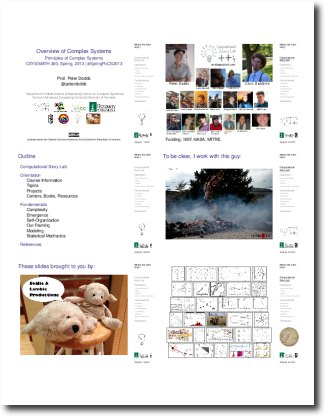
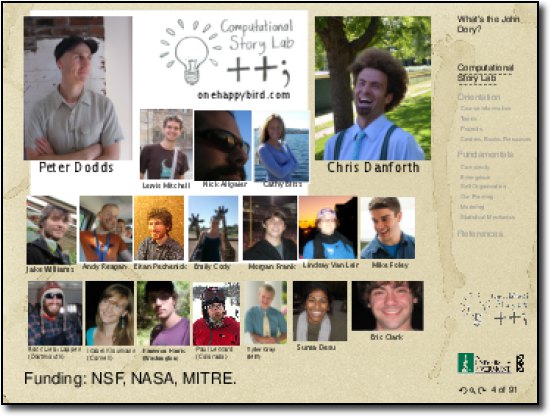
Episode 1: Overview and Complexity Manifesto:
-
Power-law size distributions:
Covered in two episodes, with the second one containing more material from the overview slides:[slides] [handout] [lecture] 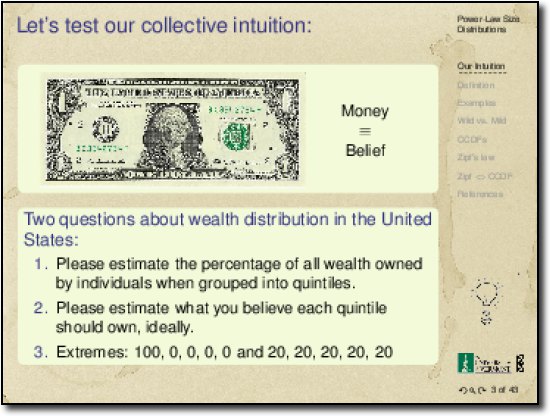
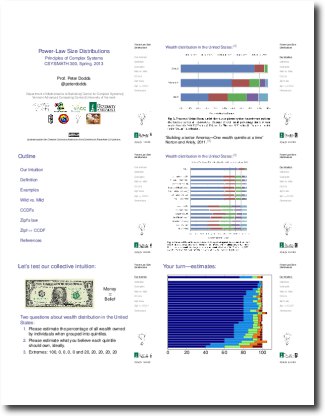
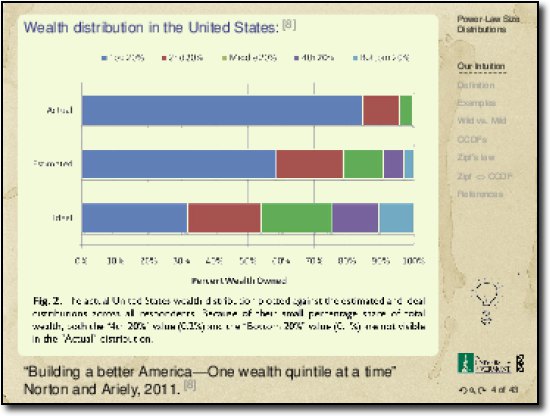
Episode 2: Power-law size distributions:
Episode 3: Zipf's law; Data, Emergence, and Limits to Understanding:
-
A touch of Zipf:
[slides] [handout] [lecture] 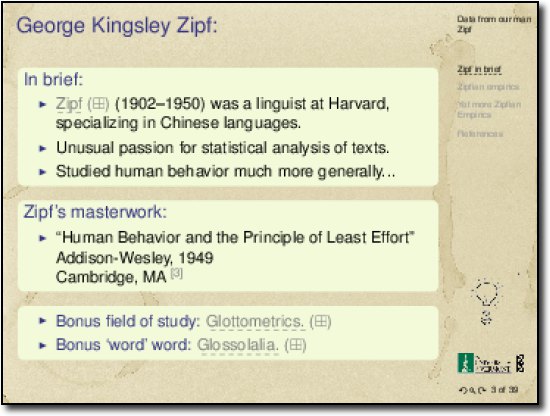
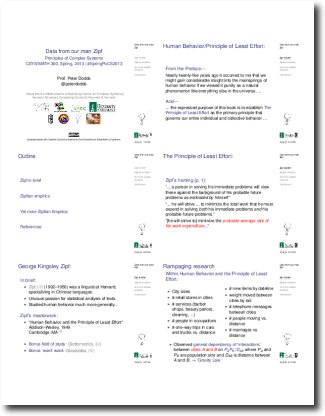
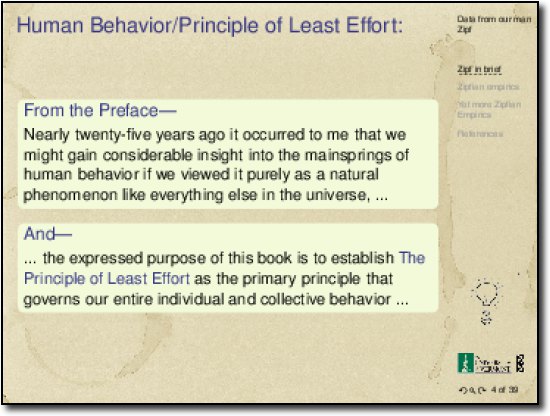
-
Mechanisms leading to power-law size distributions I, including randomness:
[slides] [handout] [lecture] 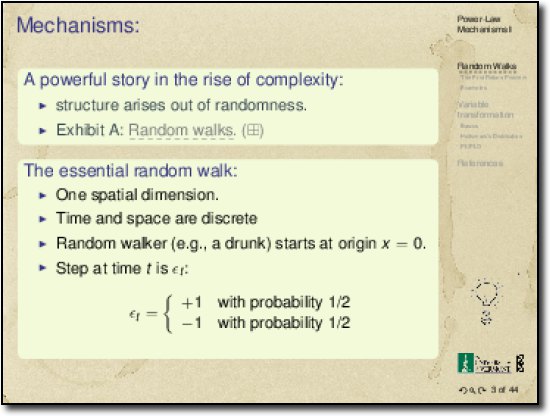
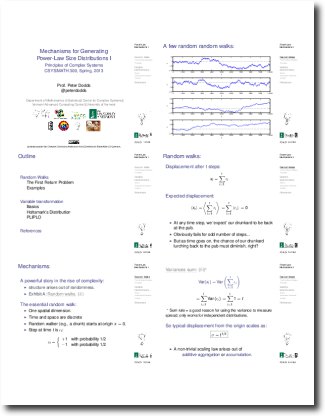
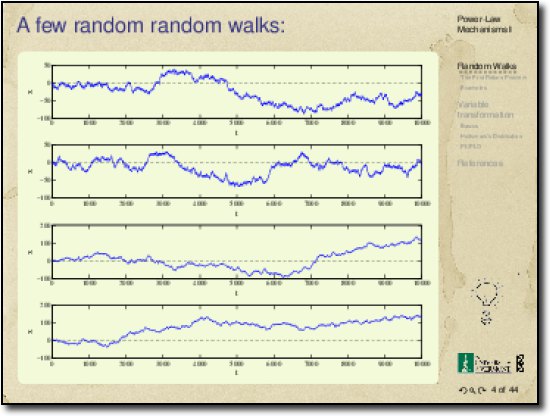
Episode 4: Zipfian Observations & Random Walks:
Episode 5: Random walks, Variable Transformations, and Projects:
(This was supposed to be the paintball episode. Funding is a little tight.)
-
Some suggestions for projects:
[slides] [handout] [lecture] 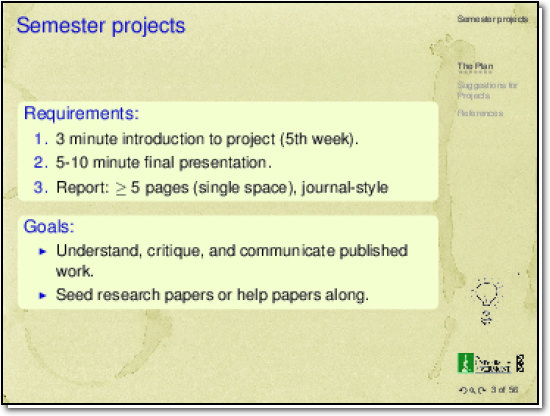
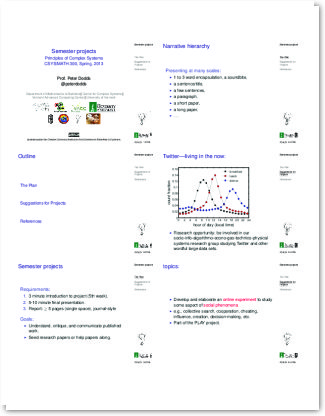
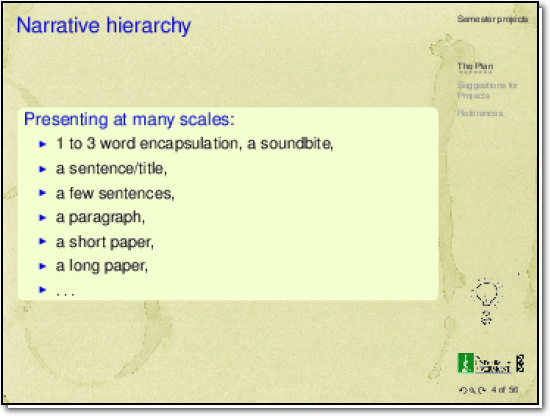
-
Mechanisms leading to power-law size distributions II, including Herbert Simon's and Benoît Mandelbrot's ideas about each other's ideas:
[slides] [handout] [lecture] 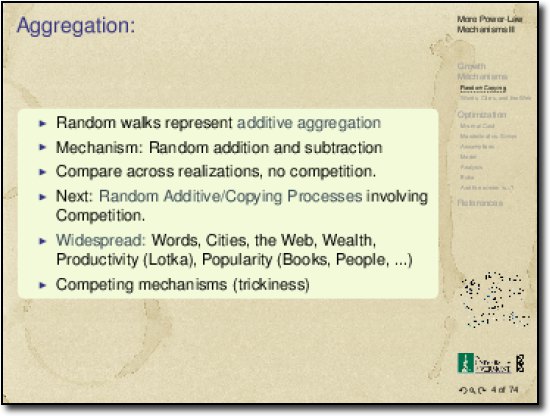
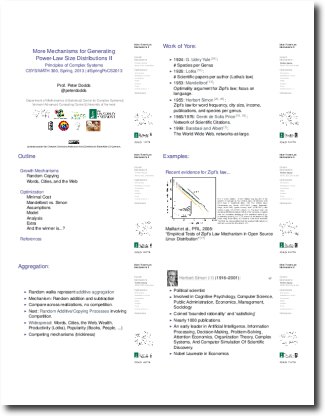
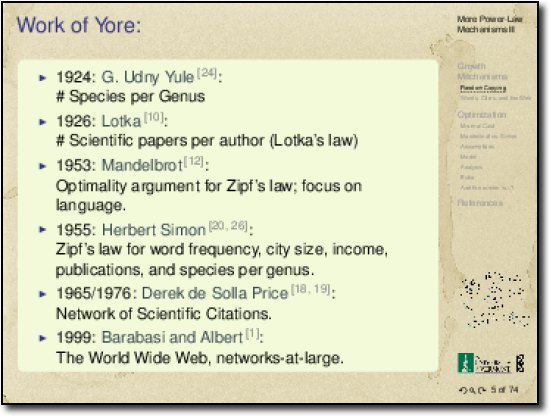
Episode 6: Simon's Rich-Get-Richer Model:
(In the beginning there was the word, and that word was "Ook". Also: elephants.)
Tweet
Episode 7: The Quickening—Benoit Mandelbrot takes on Herbert Simon with optimization-fu in "My Theory is much better than yours will ever be":
(Barely related: see Colbert punditry-based Quickening here and here.)
-
Benford's law:
[slides] [handout] [lecture] 
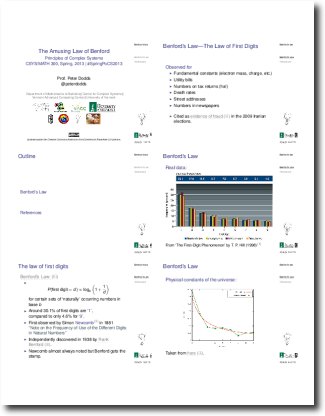
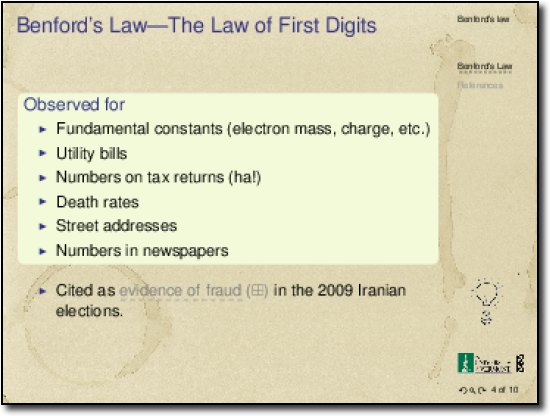
-
Robustness, Fragility, and Scaling:
[slides] [handout] [lecture] 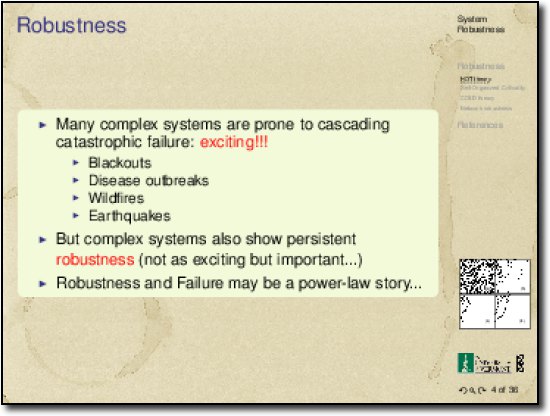
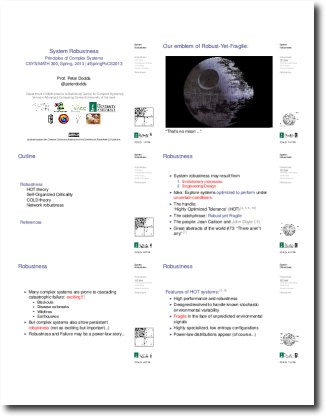
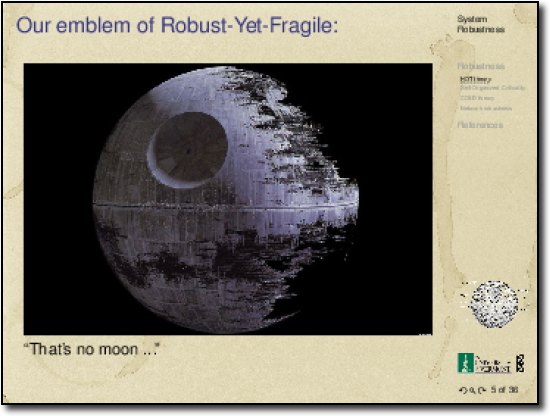
Episode 8: A tablespoon of Statistical Mechanics, a pinch of Benford's Law, and a good helping of the Robust-yet-Fragile nature of many complex systems (e.g., the Death Star):
-
Language evolution:
[slides] [handout] [lecture] 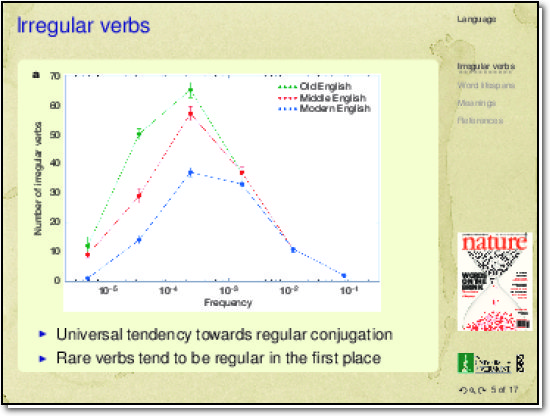
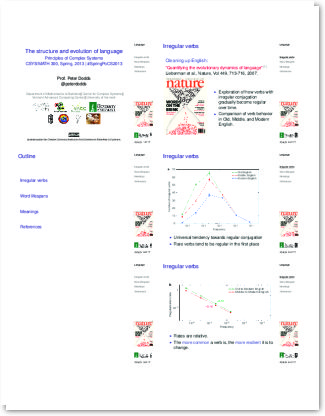
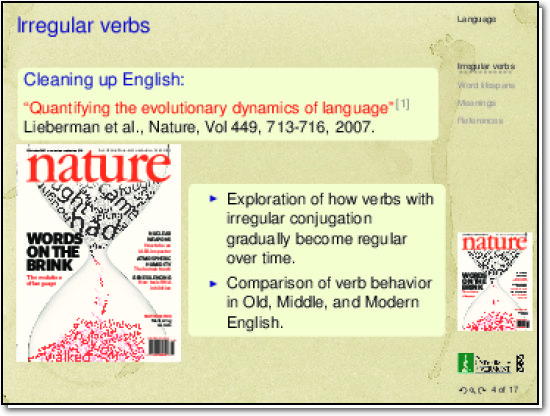
-
Lognormals and other impediments to universality:
[slides] [handout] [lecture] 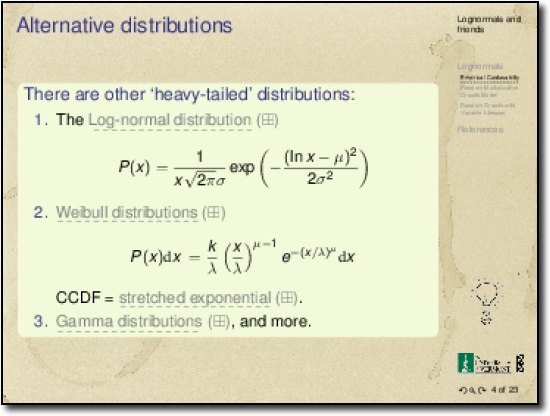

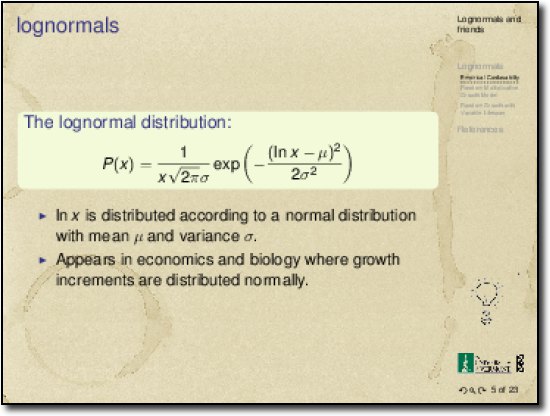
Episode 9: A little bit of happiness, more on robustness, patterns of language evolution, and sneaky kinds of heavy tailed size distributions and associated mechanisms:
Episode 9b: Guest Lecture by Executive Special Guest Star Jake Williams on Zipf's law and Simon's model for phrases.
-
Overview of complex networks:
[slides] [handout] [lecture] 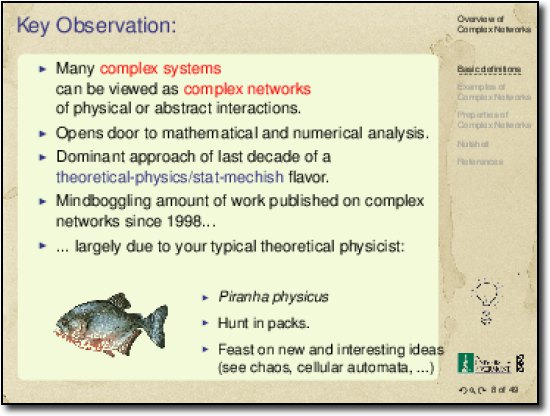
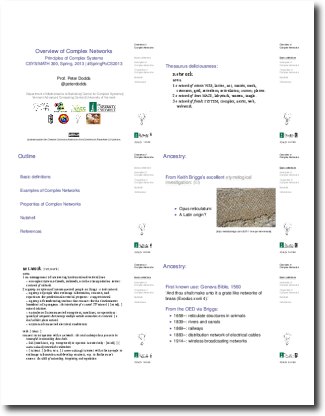
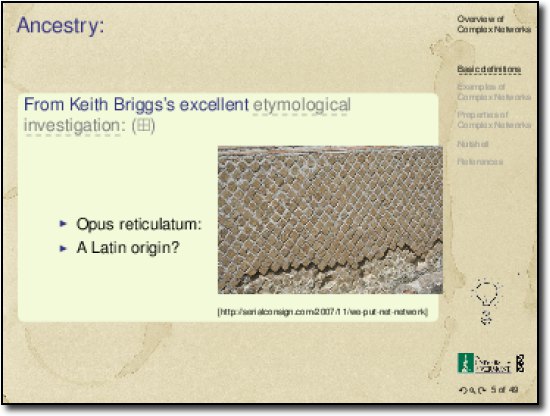
Episode 10: Overview of Complex Networks (a festival of truth):
-
Core models of complex networks including Generalized Random Networks, Small-World Networks, and Scale-Free Networks:
[slides] [handout] [lecture] 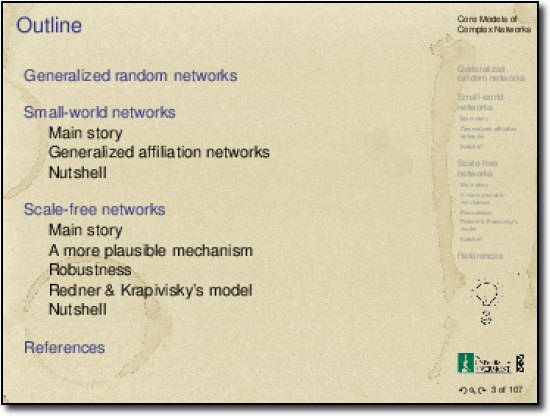
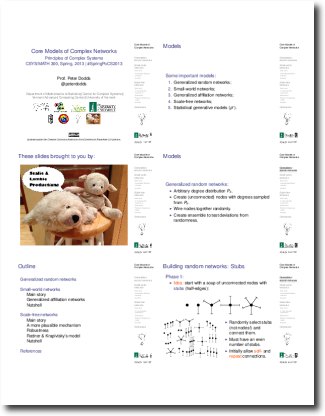
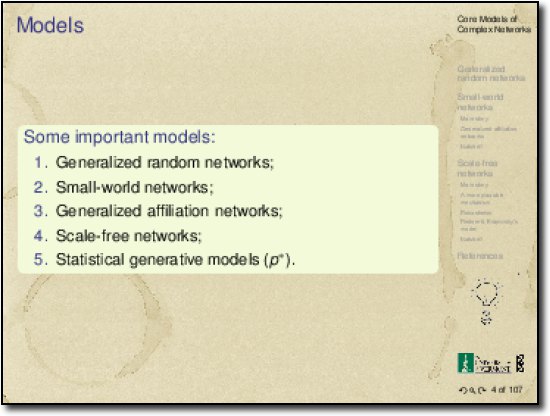
Episode 11: Complex Networks—Essential Properties and Generalized Random Networks (and why caring about becoming means we aren't in graph-theory-land anymore Toto):
Episode 12: Small-World Networks—Experiments and Harnessing Distributed Social Search to [save/destroy, delete as applicable] the World:
Episode 13: Small-World Networks—Theory bonanza (with a smidgeon of Scale-Free Networks):
Episode 14: Scale-Free Networks—Mechanisms, Universality, and Trickiness:
(Sound quality is greatly improved.)
-
Contagion-at-large and biological contagion:
[slides] [handout] [lecture] 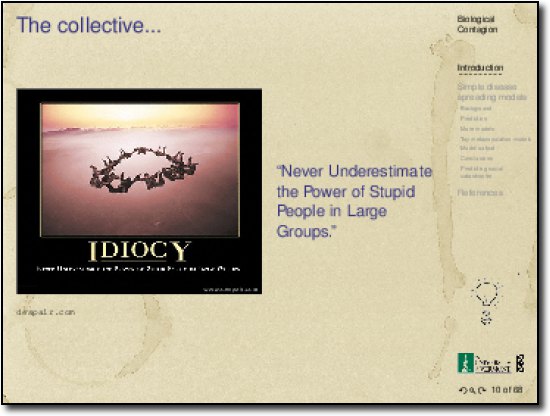
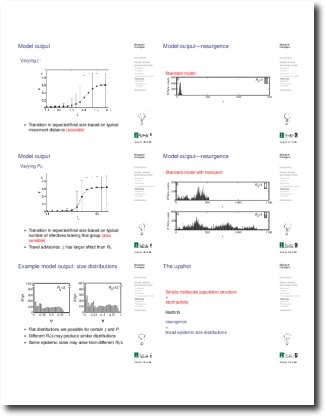
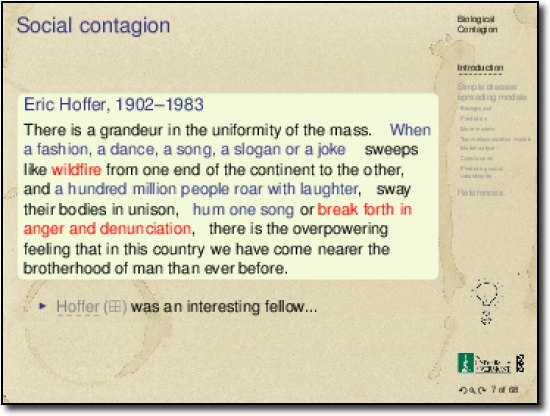
Episode 15: Scale-Free Networks (Nature abhors not the Pyramid scheme);
24:10—Contagion-at-large and the basic models of Disease Spreading:
Episode 16: Biological contagion, the unpredictability of epidemcs, and a small taste of Social Contagion:
-
Social contagion:
[slides] [handout] [lecture] 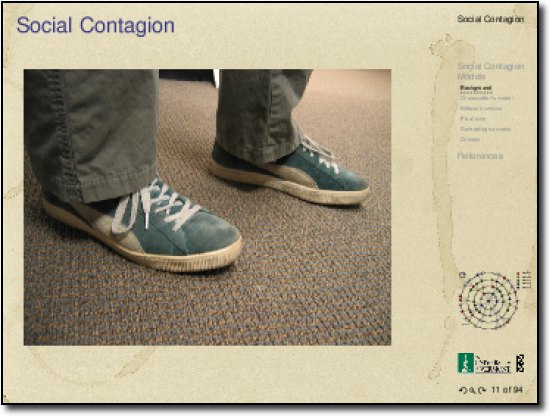
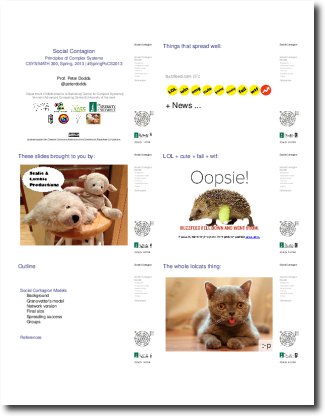
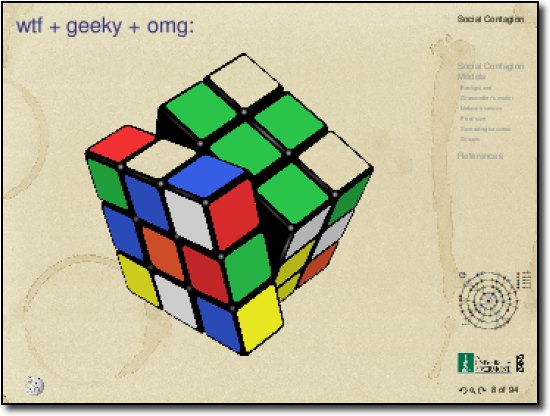
Episode 17: Social contagion: background, six types of influence, Granovetter's mean-field model:
(Do you know whom your friends have been copying?)
Episode 18: Social contagion: Watts's random network model, inklings of Why Things Take Off, more Robust-yet-Fragile action, and a cat-patting-based introduction:
Episode 19: Social contagion—Gleesons's final size calculations, influentials versus average people (really: why do things take off?), and the effect of groups on spreading:
-
Allometric Scaling:
Episode 20: Much about Scaling in Systems: isometery, allometry, and at 57:45, the start of a Department of Truthicide Investigation into the Church of Quarterology. #watchoutforthecabal[slides] [handout] [lecture] 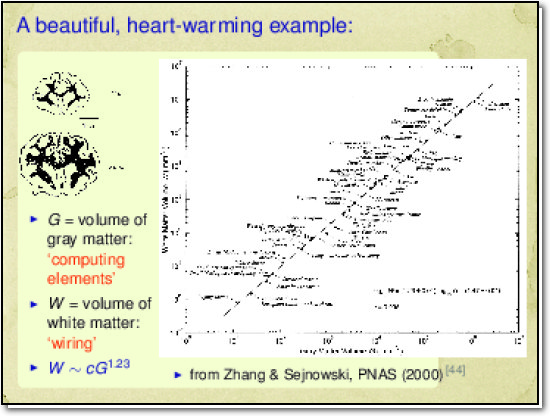
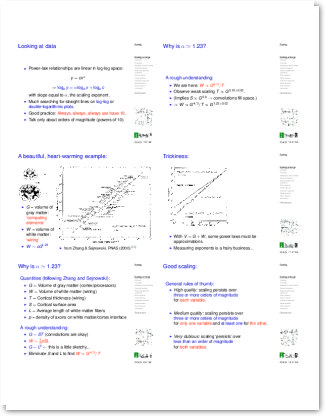
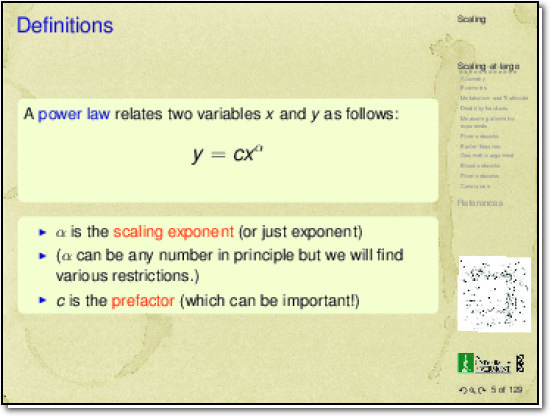
Episode 21: More scaling fun things for a warm up (includes Legos and Moore's law about moreness), and then on with our Truthicide Investigation into the Church of Quarterology. #watchoutforthecabal
Episode 22: Scaling: theories for metabolic rates and river networks. Truthicide Investigation into the Church of Quarterology reaches the trial stage. #they'reafterme
-
Voting and the role of social construction in creating superstars:
Episode 23: Closing statements in the Truthicide Investigation into the Church of Quarterology, and then on to voting, success, and superstardom (how-to).[slides] [handout] [lecture] 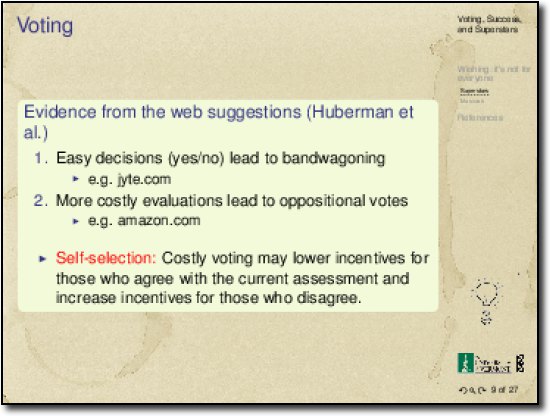
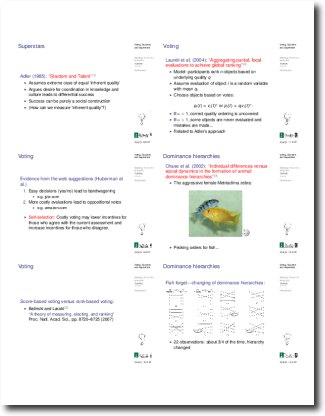
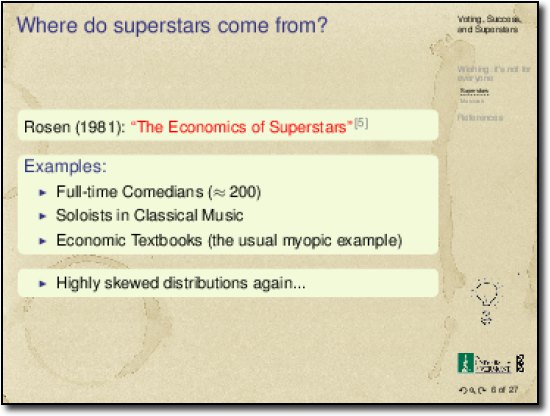
-
Contagious stories:
Episode 24: How to become famous, and contagious stories.[slides] [handout] [lecture] 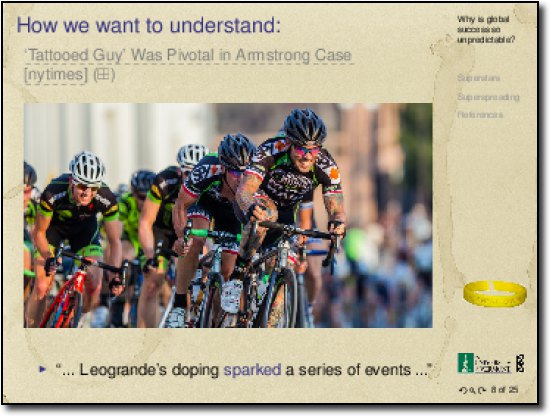
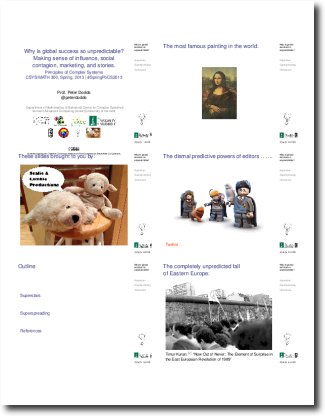

(Messed up the sound again.)
-
Happiness:
Episode 25: Finding Happiness the Big Data Way.[slides] [handout] [lecture] 
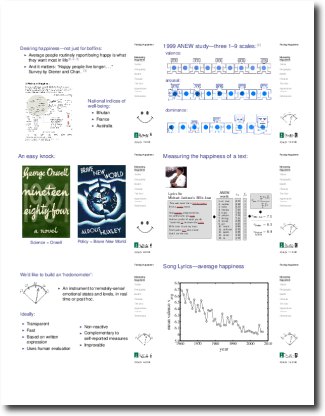
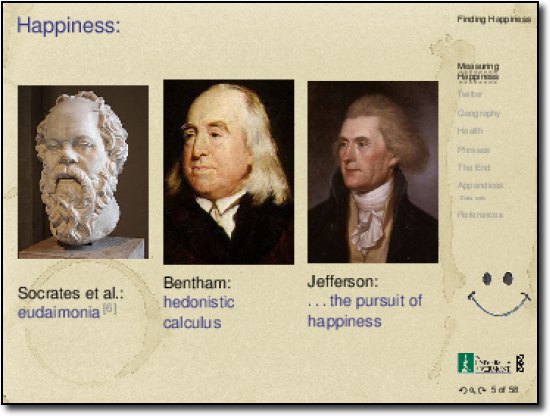
-
Complexification, the Arrow of Complexity, and the Big Transitions:
Episode 26: More happiness then the course's coda: The Theory of Anything, Universality and Chance, Complexification, and Stories.[slides] [handout] [lecture] 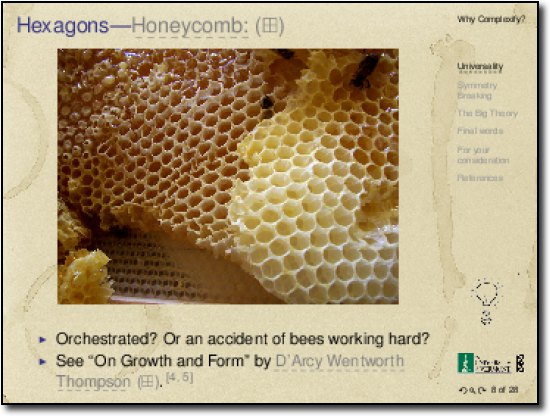
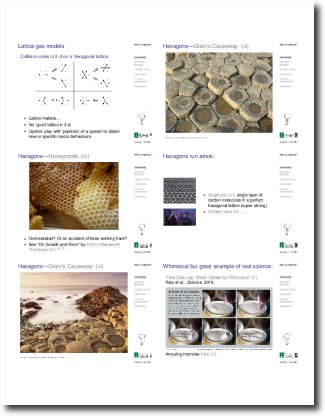
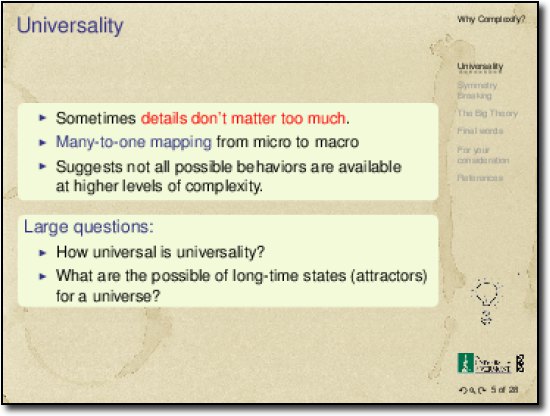
-
Sociotechnical Phenomena—computation and algorithms:
[slides] [handout] [lecture]
-
Percolation, criticality, and phase transitions:
[slides] [handout] [lecture]
-
Personality distributions:
[slides] [handout] [lecture]
-
Shocks and Memory:
[slides] [handout] [lecture]
-
Dragon Kings:
[slides] [handout] [lecture]
-
Cooperation:
[slides] [handout] [lecture]
-
Prediction:
[slides] [handout] [lecture]
-
Collective Intelligence:
[slides] [handout] [lecture]
-
Cities:
[slides] [handout] [lecture]
-
Entropy:
[slides] [handout] [lecture]
-
Information theory:
[slides] [handout] [lecture]
-
Generalized contagion:
[slides] [handout] [lecture]
-
Chaotic contagion:
[slides] [handout] [lecture]
Additional topics and extra lectures:
Collected course bibliography:
-
[slides]
[handout]
[lecture]

This work is licensed under a Creative Commons Attribution-Noncommercial-Share Alike 3.0 Unported License.